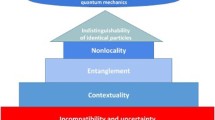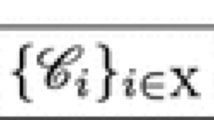Abstract
Intuitively, the more powerful a theory is, the greater the variety and quantity of ideas can be expressed through its formal language. Therefore, when comparing two theories concerning the same subject, it seems only reasonable to compare the expressive powers of their formal languages. On condition that the quantum mechanical description is universal and so can be applied to macroscopic systems, quantum theory is required to be more powerful than classical mechanics. This implies that the formal language of Hilbert space theory must be more expressive than that of Zermelo-Fraenkel set theory (the language of classical formalism). However, as shown in the paper, such a requirement cannot be met. As a result, classical and quantum formalisms cannot be in a hierarchical relation, that is, include one another. This fact puts in doubt the quantum-classical correspondence and undermines the reductionist approach to the physical world.

Similar content being viewed by others
References
Christopher, G.T.: Information, immaterialism, instrumentalism: old and new in quantum information. In: Bokulich, A., Jaeger, G. (eds.) Philosophy of Quantum Information and Entanglement, pp. 208–228. Cambridge University Press, Cambridge (2010)
Kevin C, Klement: Propositional Logic. In The Internet Encyclopedia of Philosophy, ISSN 2161-0002. https://www.iep.utm.edu/prop-log/ (2020)
Stuart, S.: On Wavefunction Collapse, the Einstein-Podolsky-Rosen Paradox and Measurement in Quantum Mechanics and Field Theory. https://arXiv:1910.11134 (2021)
Laloë, F.: Do we really understand quantum mechanics? Strange correlations, paradoxes, and theorems. Am. J. Phys. 69, 655–701 (2001)
Scully, M., Drühl, K.: Quantum eraser: a proposed photon correlation experiment concerning observation and “delayed choice’’ in quantum mechanics. Phys. Rev. A 25(4), 2208–2213 (1982)
Hardy, L.: Quantum mechanics, local realistic theories, and Lorentz-invariant realistic theories. Phys. Rev. Lett. 68(20), 2981–2984 (1992)
Frauchiger, D., Renner, R.: Quantum theory cannot consistently describe the use of itself. Nat. Commun. 9, 3711 (2018)
Bolotin, A.: Hardy’s paradox according to non-classical semantics. J. Math. Phys. 59:062101–1–062101–8 (2018)
Nurgalieva, N., del Rio, L.: Inadequacy of modal logic in quantum settings. In: G. Chiribella, P. Selinger (Eds.), 15th International Conference on Quantum Physics and Logic (QPL 2018), pp. 267–297. EPTCS 287 (2019)
Boge, F.J.: Quantum information versus epistemic logic: an analysis of the Frauchiger-Renner theorem. Found. Phys. 49, 1143–1165 (2019)
Faye, J.: Copenhagen interpretation of quantum mechanics. In: E. Zalta (Ed.), The Stanford Encyclopedia of Philosophy. Metaphysics Research Lab, Stanford University, https://plato.stanford.edu/archives/win2019/entries/qm-copenhagen/ (2019)
Fraassen, B. van: Formal Semantics and Logic. Nousoul Digital Publishers. https://www.princeton.edu/-fraassen/FormalSemanticsandLogic.pdf (2016)
Shaw, J.R.: What is a truth-value gap? Linguistics Philos. 37, 503–534 (2014)
Baskent, C.: Some topological properties of paraconsistent models. Synthese 190, 4023–4040 (2013)
Birkhoff, G., von Neumann, J.: The logic of quantum mechanics. Ann. Math. 37, 823–843 (1936)
Isham, C.J: Is it true; or is it false; or somewhere in between? The logic of quantum theory. In: William Demopoulos and Itamar Pitowsky, editors, Physical Theory and its Interpretation, pages 161–182. Springer, The Netherlands (2006)
Hardegree, G.M.: The conditional in quantum logic. In: Patrick Suppes, editor, Logic and Probability in Quantum Mechanics, volume 78, pages 55–72. Synthese Library (1976)
Chiara, M.L.D., Giuntini, R., Greechie, R.: Reasoning in Quantum Theory. Sharp and Unsharp Quantum Logics. Springer, Amsterdam (2004)
Putnam, H.: Is logic empirical? In Robert Cohen and Marx Wartofsky, editors, Boston Studies in the Philosophy of Science, volume 5, pages 216–241. D. Reidel Publishing Company (1968)
Dickson, M.: Quantum logic is alive \(\wedge\) (it is true \(\vee\) it is false). Philos. Sci. 68(3), S274–S287 (2001)
Kirkham, R.: Theories of Truth: A Critical Introduction. The MIT Press, Cambridge, Massachusetts (1995)
Horsten, L.: The Tarskian Turn: Deflationism and Axiomatic truth. MIT Press, Cambridge, Massachusetts (2011)
Priest, G.: Semantic closure. Studia Logica 43, 117–129 (1984)
Edwards, D.: The mathematical foundations of quantum mechanics. Synthese 42(1), 1–70 (1979)
Hodges, W. Tarski’s Truth Definitions. In Edward Zalta, editor, The Stanford Encyclopedia of Philosophy. https://plato.stanford.edu/archives/fall2018/entries/tarski-truth/ (2018)
Speaks, J.: Theories of meaning. In: Edward Zalta, editor, The Stanford Encyclopedia of Philosophy. https://plato.stanford.edu/archives/spr2021/entries/meaning/ (2021)
Mirsky, L.: An Introduction to Linear Algebra. Dover Publications, Mineola (2011)
Dever, J.: Semantic value. In: K. Brown, editor, Encyclopedia of Language & Linguistics. Reference Work (Second Edition), pp. 137–142. Elsevier Science (2006)
Piron, C.: Foundations of Quantum Physics. Benjamin Inc, W. A (1976)
Arnold, V.: Mathematical Methods of Classical Mechanics. Springer, New York (1989)
Halmos, P., Givant, S.: Introduction to Boolean Algebras. Springer, New York (2009)
Murawski, R.: Undefinability vs Definability of Satisfaction and Truth. In: Wolenski, J., Köhler, E. (eds.) Alfred Tarski and the Vienna Circle Austro-Polish Connections in Logical Empiricism, pp. 203–215. Springer, New York (1999)
Klein, U.: What is the limit \(\hbar {\rightarrow }0\) of quantum theory? Am. J. Phys. 80, 1009–1016 (2012)
Ralph, G.T.: Zermelo, reductionism, and the philosophy of mathematics. Notre Dame J. Form. Logic 34(4), 539–563 (1993)
Tegmark, M., Wheeler, J.A.: 100 Years of the quantum. Sci. Am. 284, 68–75 (2001)
Landsman, N.: Between classical and quantum. In: Butterfield, J., Earman, J. (eds.) Handbook of the Philosophy of Science; Philosophy of Physics, Part A, vol. 2, pp. 417–553. Elsevier, Horth-Holland (2007)
Gerard ’t Hooft: Fast Vacuum Fluctuations and the Emergence of Quantum Mechanics. Foundations of Physics 51(63), (2021)
Karel, H., Thomas, J.: Introduction to Set Theory. Revised and Expanded, 3rd edn. CRC Press, Boca Raton (1999)
Baratella, S., Ferro, R.: A theory of sets with the negation of the axiom of infinity. Math. Logic Quart. 39, 338–352 (1993)
Suppes, P.: Finitism in geometry. Erkenntnis 54, 133–144 (2001)
Bendegem, Van, Paul, Jean: Finitism in Geometry. In Edward N. Zalta, editor, The Stanford Encyclopedia of Philosophy. https://plato.stanford.edu/archives/fall2020/entries/geometry-finitism (2020)
Feferman, S.: Does mathematics need new axioms? American Mathematical Monthly 106, 99–111 (1999)
Acknowledgements
The author wishes to thank the anonymous referee for the productive comments and interesting remarks that helped offset shortcomings of a draft of this paper.
Author information
Authors and Affiliations
Corresponding author
Additional information
Publisher's Note
Springer Nature remains neutral with regard to jurisdictional claims in published maps and institutional affiliations.
Rights and permissions
About this article
Cite this article
Bolotin, A. The Paradox of Classical Reasoning. Found Phys 52, 87 (2022). https://doi.org/10.1007/s10701-022-00604-7
Received:
Accepted:
Published:
DOI: https://doi.org/10.1007/s10701-022-00604-7




